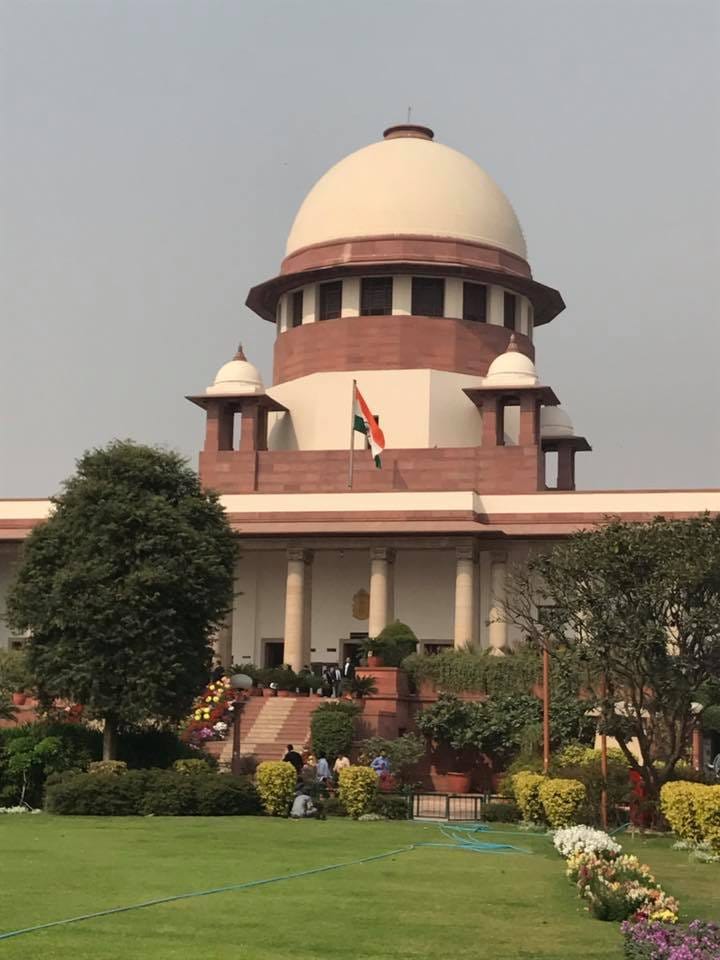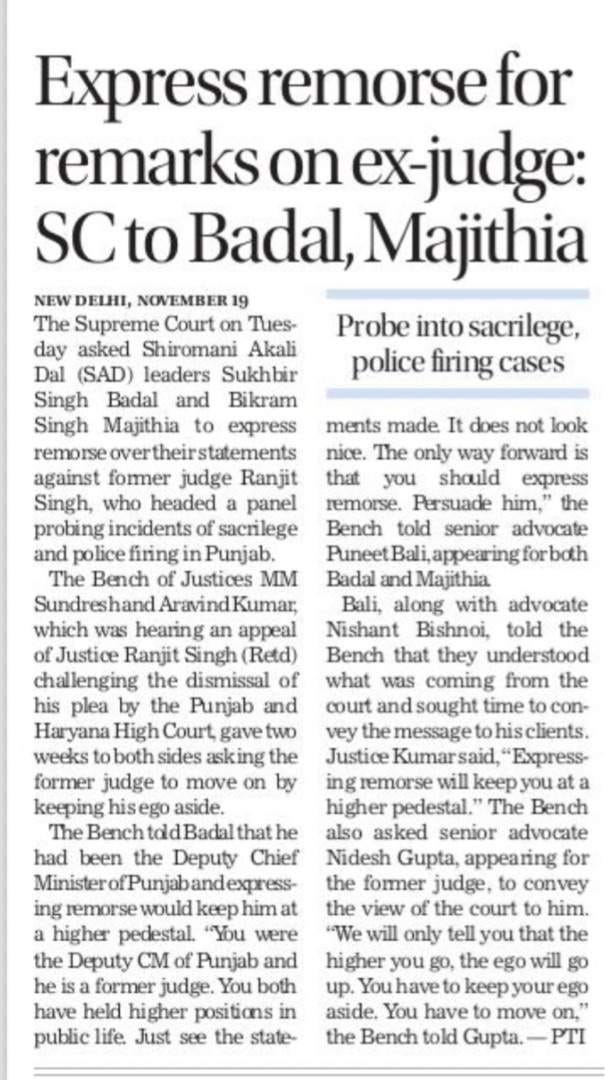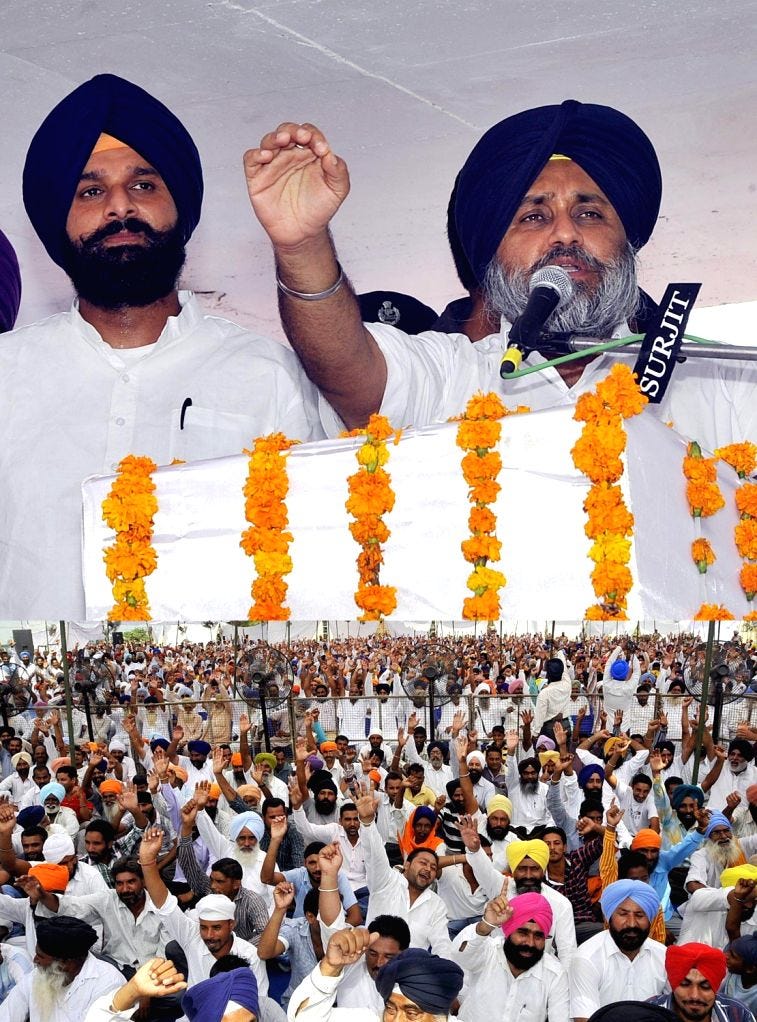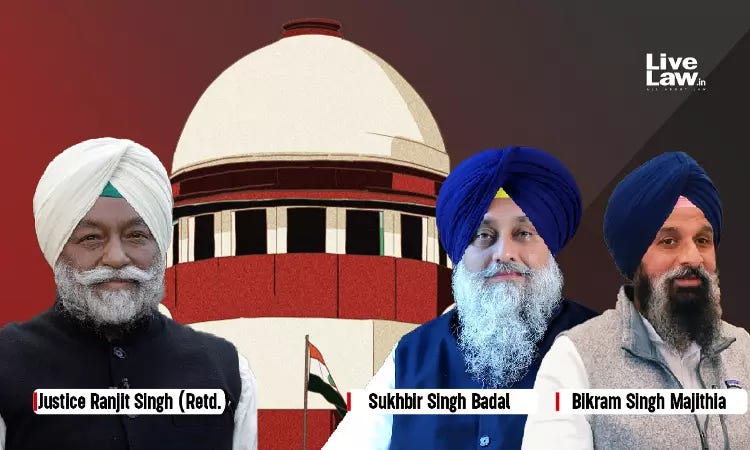Supreme Court Raps Sukhbir Badal and Bikram Majithia in Justice Ranjit Singh Commission Matter
To expedite proceedings, Punjab and Haryana High Court could consider assigning all related cases to a single judge in Chandigarh, ensuring consistency & efficiency, ideally through day-to-day hearing
Supreme Court Demands Statesmanship
In a strong rebuke, the Supreme Court on Tuesday (November 19) directed Shiromani Akali Dal (SAD) leaders Sukhbir Singh Badal and Bikram Singh Majithia to express remorse for their critical remarks against Justice Ranjit Singh, who headed a statutory Commission of Inquiry probing the sacrilege incidents of 2015 and subsequent police firings in Punjab.
A bench of Justices M.M. Sundresh and Aravind Kumar, while hearing an appeal by Justice Ranjit Singh challenging the Punjab and Haryana High Court's dismissal of his plea, emphasized the importance of humility. The Apex Court remarked, “You were the Deputy CM of Punjab, and he is a former judge. You both have held high offices. Just see the statements made. It does not look nice. The only way forward is that you should express remorse.”
The bench stressed that remorse would elevate the SAD leaders as well as the former Judge to a “higher pedestal” and urged both sides to set aside egos and move forward in the larger interest of justice and reconciliation.
Ranjit Singh Commission: A Critical Investigation
Constituted in 2017 under the Congress government in Punjab, headed by Captain Amarinder Singh, the Ranjit Singh Commission delved into the sensitive incidents of sacrilege involving the Sri Guru Granth Sahib and the subsequent police firings at Behbal Kalan and Kotkapura.
The Commission’s findings revealed:
Link to Dera Sacha Sauda: Direct connections between the sacrilege incidents and followers of the Dera were established.
Role of Parkash Singh Badal: The report indicated that former Chief Minister Parkash Singh Badal had prior knowledge of the police action at Kotkapura.
Police Firing Deemed Unjustified: The firing on peaceful protesters was found to be excessive and unwarranted.
These revelations led to heightened tensions and public outrage, prompting further legal and investigative actions.
Previous Inquiry by Zora Singh Commission
The earlier Zora Singh Commission, established by the SAD-BJP government in 2015, faced widespread criticism for failing to hold key figures accountable. The Congress government dismissed its findings as inadequate and formed the Ranjit Singh Commission to re-examine the events in their entirety.
SIT Investigations and Judicial Proceedings
To address the issues identified by the Commissions, several Special Investigation Teams (SITs) were constituted to professionally investigate the offences detailed in various FIRs and to establish formal criminal charges against individuals found to be prima facie guilty. It is important to note that the findings of any Commission of Inquiry, while being strong pieces of evidence, cannot be directly used to convict a person. Conviction requires the registration of a formal FIR, followed by a thorough investigation by the police, the submission of a challan, and the framing of charges by the jurisdictional criminal or judicial court. The trial process then determines the outcome, which can result in either acquittal or conviction, with the quantum of punishment being decided in the event of a conviction.
Behbal Kalan Firing Case
The initial SIT, led by ADGP Pramod Kumar, filed five chargesheets, starting in 2019, against seven accused, including senior police officials.
Former SSP Charanjit Sharma was named as a conspirator in the first chargesheet, followed by subsequent indictments of former DGP Sumedh Singh Saini and IGP Paramraj Singh Umranangal in 2021.
Despite multiple chargesheets, no charges have been framed, and the case remains stalled in Court, as per our internet research.
Kotkapura Firing Case
A fresh SIT led by ADGP L.K. Yadav filed a chargesheet in February 2023 against prominent figures, including late former Chief Minister Parkash Singh Badal, former Deputy CM Sukhbir Badal, and six police officials.
Proceedings in the case have also faced delays due to procedural challenges and jurisdictional disputes.
Jurisdictional Hurdles
In May 2023, the Punjab and Haryana High Court transferred the Behbal Kalan case to Chandigarh, citing the need for a neutral venue.
The Kotkapura firing case is also likely to be shifted to Chandigarh, with pending petitions in the High Court for a transfer.
Sacrilege Cases
The Supreme Court recently lifted a stay by the Punjab and Haryana High Court on proceedings against Dera Sacha Sauda chief Gurmeet Ram Rahim Singh in related sacrilege cases, paving the way for trials to resume.
Challenges in Delivering Justice
While multiple judicial commissions of inquiry and SITs have worked tirelessly and diligently to uncover the truth and present prosecutable evidence, the judicial process has been frustratingly slow in the eyes of the general public in Punjab and even among the legal fraternity. Despite the passage of nearly a decade, victims and their families continue to await justice. Delays in SIT investigations, coupled with their belated submissions to jurisdictional judicial courts, have been further compounded by procedural roadblocks. These include appeals, revision petitions, writ petitions against interim and interlocutory orders, and transfer applications, all of which have led to significant public disillusionment and inordinate delays in the framing of criminal charges against the accused by the Sessions Court.
Supreme Court’s Strong Words on Ego and Accountability
The Supreme Court’s observations on remorse extend beyond personal criticism, serving as a broader commentary on accountability in public life. Addressing the counsel for petitioner and retired High Court Judge Justice Ranjit Singh, Justice Kumar remarked, “The higher you go, the ego will go up. You have to keep your ego aside. You have to move on.”
Summing Up: The Need for Speedy Trials
While constitutional courts have actively addressed these sensitive issues, the slow pace of trials has been a disservice to justice. Cases of such grave public significance demand swift resolution to ensure accountability and restore public faith in the judicial system. As the adage goes, “Justice delayed is justice denied,” and these trials must conclude expeditiously in accordance with due process of law.
To expedite proceedings, the Punjab and Haryana High Court could consider assigning all related cases to a single judge in Chandigarh, ensuring consistency and efficiency, ideally through day-to-day hearings. Additionally, the appointment of a Special Public Prosecutor in these cases by the High Court would help address concerns regarding impartiality and allay fears that the so-called "deep state" within the Punjab Government might be influencing the process, either by hindering or helping the accused in these trials.
Meanwhile, as the Shiromani Akali Dal and its beleaguered president, Sukhbir Badal, navigate internal political turmoil, the people of Punjab are left with no choice but to watch and wait as justice slowly unfolds—or unravels.







